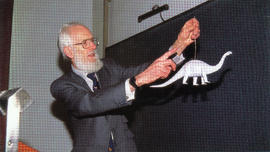Barlow was a British Psychiatrist, Physiologist and businessman. He was born in London in 1915, the second son of Sir Alan Barlow, son of Sir Thomas Barlow, royal physician. His mother was Lady Nora Barlow, daughter of Sir Horace Darwin. He was a great-grandson on the naturalist Charles Darwin. He was educated at Marlborough College and Trinity College, Cambridge where he studied medicine. He also studied at University College London.
Barlow was senior lecturer and honorary consultant in psychological medicine at St Thomas's Hospital Medical School (1951-1966), Vice Chairman of the Mental Health Research Fund, and a member of the scientific staff of the MRC Department of Clinical Research, University College Hospital. He was Chairman of the Bath Institute of Medical Engineering and a founding member of the Erasmus Darwin Foundation at Lichfield. He was also, at various times, Chairman of the Cambridge Scientific Instrument Company, the firm founded by his maternal grandfather, and a Director of CIC Investment Holdings, Deputy Chairman of George Kent Ltd and a Director of Group Investors Ltd. Barlow also published research papers in physiology and psychiatric medicine.
He was a Founder Fellow of the Zoological Society of London and its Secretary between 1980 and 1982. In 2008 the Society started the Erasmus Darwin Barlow Conservation Expeditions named in his honour.
Barlow was a trustee for over 20 years of the Barlow Collection of Oriental Art collected by his father. In 1997 Barlow, along with his brother Sir Thomas Barlow, 3rd Baronet, was awarded an honorary Doctor of Letters degree by the University of Sussex, who were bequeathed the Barlow Collection in 1968. He became a Liveryman of the Worshipful Company of Scientific Instrument Makers in 1965 and was Master for 1976-1977.
He married Brigit Ursula Hope Black, daughter of the author Ladbroke Black in 1938, and they had three children. Barlow died in Cambridge from renal failure in 2005.
